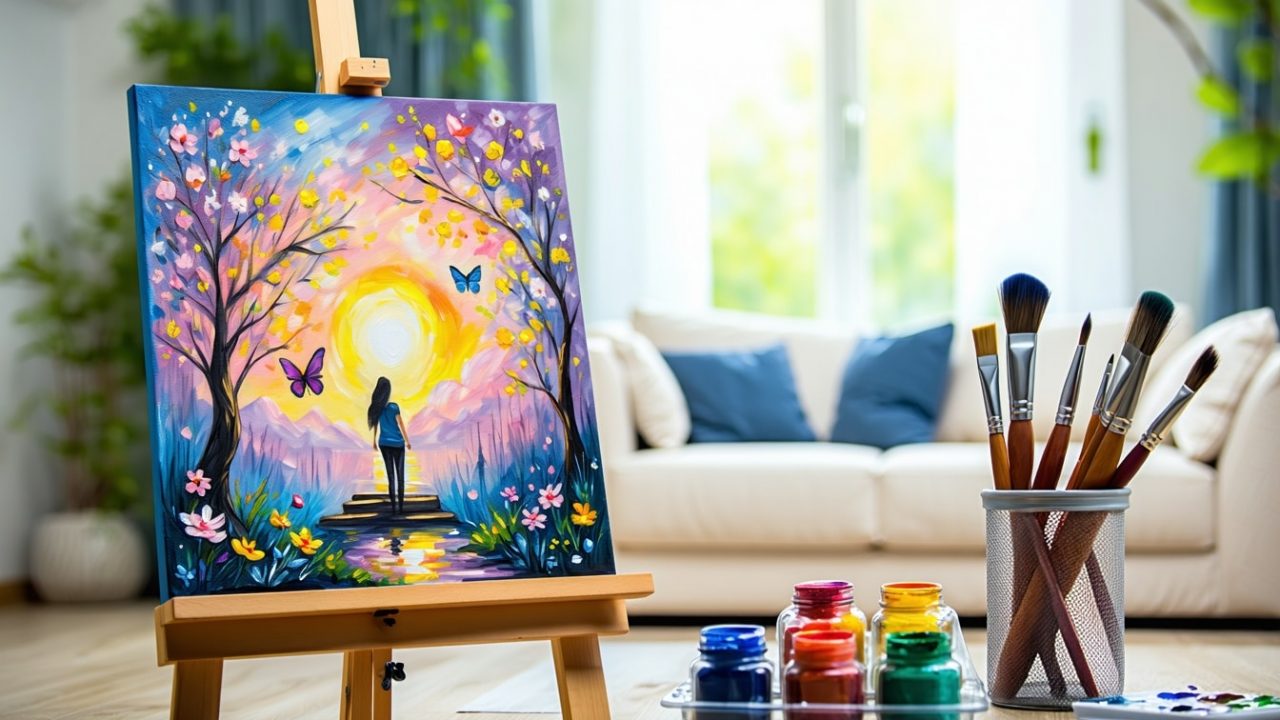Benefits of Art Therapy for Addiction Recovery
Art therapy is an innovative approach that merges creativity with therapeutic practices, offering numerous benefits for individuals undergoing addiction recovery. This section discusses the advantages of incorporating art therapy into treatment programs and its therapeutic effects on individuals.
Advantages of Incorporating Art Therapy
Incorporating art therapy into addiction treatment has been associated with notable benefits. Not only does it enhance patient engagement, but it also fosters intrinsic motivation for change and promotes the exploration of emotions. This innovative approach can complement traditional treatment methods, making recovery more holistic.
| Benefit | Description |
|---|---|
| Emotional Exploration | Art therapy allows individuals to express feelings that may be difficult to articulate. This expression can lead to deeper self-understanding and emotional insight. |
| Stress Reduction | Engaging in artistic activities has been shown to reduce stress levels, creating a more conducive environment for recovery. |
| Improved Self-Esteem | As clients create and engage in artistic expression, they may experience enhanced self-worth and confidence, which are critical components in recovery. |
| Reduced Trauma | Art therapy can help address underlying trauma, allowing individuals to process difficult experiences related to their addiction. |
| Motivation for Change | The creative process motivates individuals to engage actively in their recovery journey, fostering a sense of ownership and purpose. |
Therapeutic Effects of Art Therapy
The therapeutic effects of art therapy extend beyond creativity. Scientific studies indicate that this approach can significantly enhance recovery outcomes for those battling addiction. Art therapy promotes emotional resilience, which is crucial in preventing relapse and supporting long-term sobriety.
Among its key therapeutic effects are:
- Promoting Emotional Resilience: Through the therapeutic process, individuals learn to cope with emotions and stress, which are often triggers for substance use.
- Preventing Relapse: Engaging in art therapy may serve as a proactive measure against relapse by providing healthy coping mechanisms and emotional release.
- Enhancing Self-Awareness: This approach encourages individuals to reflect on their thoughts and feelings, leading to greater self-awareness and understanding of their addiction.
- Addressing Trauma: As many individuals with substance use disorders have a history of trauma, art therapy provides a safe avenue to confront and heal these experiences.
Art therapy is an essential component in the modern landscape of addiction treatment, offering unique opportunities for individuals to navigate their recovery journey creatively and effectively. If you are considering treatment options, it is important to explore the potential of art therapy addiction treatment as part of a comprehensive recovery program.
Utilizing Art Therapy in Substance Abuse Treatment
Art Therapy Techniques
Art therapy techniques play a crucial role in substance abuse treatment. These techniques not only facilitate emotional exploration but also promote engagement, aiding individuals on their recovery journey. Some effective art therapy techniques include:
- Drawing and Painting: Encouraging individuals to express their feelings through visual art can help in processing complex emotions associated with addiction.
- Collage Making: This method enables participants to piece together images and textures that represent their experiences or aspirations.
- Sculpting: Working with clay or other materials can provide a tactile way to express and work through feelings.
- Creative Writing: Journaling or poetry can be powerful tools for reflection and self-expression.
- Music Integration: Combining visual art with music therapy can enhance emotional connection and creativity.
Studies show that incorporating art and music therapy into substance abuse treatment has led to improvements in patient engagement and motivation for change (NCBI). These techniques are beneficial for addressing the underlying issues related to addiction, making them a vital component of the recovery process.
Role of Art Therapy in Recovery
Art therapy serves multiple roles in the recovery from substance abuse. It can facilitate numerous therapeutic benefits, including:
- Emotional Release: By expressing emotions through art, individuals can relieve stress and anxiety, making it easier to confront underlying issues linked to their addiction.
- Enhancing Self-Awareness: Engaging in creative activities encourages self-reflection, helping you to understand your emotions and behaviors better.
- Building Emotional Resilience: Art therapy can promote resilience by enabling you to develop healthy coping mechanisms, ultimately reducing the chances of relapse.
- Reducing Trauma: For those with a history of trauma, art therapy can provide a safe space to process and express traumatic experiences, which is essential for healing (Addiction Center).
Furthermore, art therapy has been associated with preventing relapse by replacing negative coping mechanisms with positive alternatives. This constructive outlet can prove invaluable during overwhelming times.
To fully integrate art therapy into your recovery, it is often combined with traditional treatments such as intensive outpatient programs or dual diagnosis treatment, enhancing the overall effectiveness of your substance use treatment plan. Whether you are looking at opioid rehab or alcohol rehab, utilizing art therapy can empower you and foster a deeper sense of healing.
Impact of Art Therapy on Trauma and PTSD
Art therapy has emerged as a powerful tool in addressing trauma and post-traumatic stress disorder (PTSD) within addiction treatment. This innovative approach not only aids in the management of substance use disorders but also provides a unique pathway for healing from past traumas.
Addressing Trauma with Art Therapy
Individuals dealing with trauma often face challenges in expressing their emotions and experiences verbally. Art therapy allows for a different form of expression, activating brain networks related to reward, stress, and inhibition influenced by traumatic events. Engaging in creative activities can help individuals reconnect with their emotions, making it easier to address and work through their trauma.
Art therapy has been shown to enhance motivation, insights, and learning, providing a medium through which clients can visually encode their traumatic memories. This process can be particularly beneficial for those with cognitive challenges, as it offers an experiential way to engage with their past. For those interested in trauma-informed care, understanding how art therapy fits within that framework is vital.
Art Therapy for Individuals with PTSD
For individuals suffering from PTSD, art therapy can play a crucial role in reducing symptoms and improving overall treatment retention. Many individuals with PTSD may turn to substances as a means of coping with their distressing symptoms. By integrating trauma therapy with addiction treatment, art therapy allows for a dual-focus—addressing both trauma and substance use simultaneously.
Moreover, art therapy has been found effective in increasing clients’ sense of self-efficacy. The relaxation that often accompanies creative expression may facilitate recall of implicit memories associated with traumatic experiences, making it a valuable tool in recovery. Since clients report that their therapeutic alliance with their counselors or therapists is a valued aspect of treatment, incorporating art therapy may strengthen this alliance and enhance the overall effectiveness of treatment (PMC).
Art therapy addiction treatment aligns well with various methods offered at Nova Transformations, including dual diagnosis treatment and outpatient drug rehab programs, ensuring a comprehensive approach to recovery. Through creative outlets, you or your loved one can develop healthier coping strategies while addressing the underlying trauma that may contribute to substance use.
Effectiveness of Art Therapy in Addiction Treatment
Enhancing Emotional Resilience
Art therapy has been shown to offer significant benefits in addiction recovery by promoting emotional resilience. This form of therapy helps individuals manage stress and enhances their ability to cope with challenges related to substance dependence. Through creative expression, art therapy allows you to process difficult emotions and experiences, fostering a sense of empowerment in your recovery journey.
Scientific evidence supports this therapeutic approach, indicating that art therapy can lead to improvements in cognitive functions like attention, emotional regulation, and motivation. Such enhancements are crucial for individuals recovering from addiction as they work to rebuild their lives.
| Benefit of Art Therapy | Description |
|---|---|
| Stress Reduction | Helps alleviate anxiety and stress during recovery. |
| Emotional Awareness | Increases self-awareness and understanding of emotional triggers. |
| Self-Esteem Improvement | Fosters a positive self-image through creative expression. |
Preventing Relapse through Art Therapy
Preventing relapse is a critical aspect of addiction recovery, and art therapy plays a valuable role in this process. According to studies, this form of therapy can help substitute negative coping mechanisms with positive outlets. Engaging in creative activities provides you with a constructive way to express feelings when overwhelmed, reducing the temptation to revert to substance use.
Art therapy also contributes to the restoration of the brain’s reward system, which can help in making pro-recovery decisions. By engaging large-scale brain networks involved in addiction, art therapy aids in enhancing emotional regulation and improving overall well-being, making it an effective tool for relapse prevention. For more insights on addiction treatment strategies, consider exploring options such as alcohol rehab, opioid rehab, or intensive outpatient programs.
| Relapse Prevention Benefits | Description |
|---|---|
| Positive Coping Strategies | Replaces harmful habits with healthy creative outlets. |
| Enhanced Motivation | Improves motivation through rewarding creative experiences. |
| Better Emotional Regulation | Promotes skills to manage emotions effectively. |
Incorporating art therapy into your recovery plan can enhance emotional resilience and provide invaluable support in preventing relapse. This innovative approach aligns well with treatment programs offered by facilities like Nova Transformations, emphasizing holistic and comprehensive care.
Integrating Art Therapy with Traditional Treatments
Incorporating art therapy into substance abuse treatment programs can significantly enhance recovery outcomes, offering valuable tools and techniques alongside traditional therapeutic methods. This integration emphasizes the complementary role of art therapy and how it aligns with evidence-based practices in addiction treatment.
Complementary Role of Art Therapy
Art therapy serves as a powerful complement to traditional treatment options. By addressing the emotional and psychological challenges associated with addiction, art therapy can significantly engage patients and motivate them toward change. It is particularly effective in helping individuals explore complex emotions and painful experiences related to substance use disorders.
Studies show that integrating art and music therapy into treatment programs can lead to increased patient engagement and a stronger sense of intrinsic motivation for recovery. This engagement not only aids emotional exploration but also complements the fundamentals of traditional therapies, such as 12-step models and behavioral approaches (NCBI).
| Benefits of Art Therapy | Description |
|---|---|
| Enhanced Engagement | Increases patient motivation and involvement in treatment. |
| Emotional Exploration | Helps individuals address deep-seated emotions and trauma. |
| Complementary Tool | Supports traditional treatment methods without replacing them. |
Art Therapy in Conjunction with Evidence-Based Practices
The effectiveness of art therapy is maximized when it is integrated with established evidence-based practices. Research indicates that this integration can improve treatment outcomes for individuals experiencing substance use disorders (SUD). Art therapy can activate key neural networks involved in trauma recovery, making it a valuable tool for engaging individuals who may struggle with cognitive challenges related to addiction.
By using art therapy alongside cognitive-behavioral therapy (CBT), medication-assisted treatments, and other approaches, you ensure that you are addressing the multifaceted nature of addiction. This comprehensive treatment model facilitates deeper understanding and fewer feelings of denial, compulsion, and depression, thereby enhancing the overall recovery process.
For those interested in exploring the benefits of combining various therapeutic methods, it is crucial to consider how art therapy can be tailored to fit into your personalized treatment plan. Whether you are looking at programs for alcohol rehab, opioid rehab, or any other substance use treatment, understanding the unique contributions of art therapy can be an essential part of your recovery journey.
Art Therapy for Self-Expression and Coping
Art therapy serves as a powerful tool for self-expression and coping strategies, especially during addiction treatment. Through the creative process, you can navigate complex emotions, reduce stress, and communicate thoughts that may be difficult to express verbally.
Creative Outlet for Self-Expression
Engaging in artistic activities allows you to explore your feelings in a safe and nurturing environment. Whether it’s painting, drawing, or sculpting, art therapy provides a medium for self-expression that can lead to increased emotional intelligence. This form of therapy has been observed to help individuals communicate effectively, especially those with brain injuries or verbal impairments often accompanying substance use disorders.
Art therapy is beneficial in fostering meaningful insight and overcoming interpersonal challenges. You may find that creating art not only enhances your emotional well-being but also contributes to a supportive recovery process.
Managing Emotions through Art Therapy
Art therapy is scientifically proven to aid in stress reduction, promoting emotional resilience, and improving overall mood. Research indicates that it activates brain regions related to reward processing, emotional regulation, and memory, making it an effective strategy to improve mental health and reduce stress associated with addiction (PMC).
Through artistic expression, you can process emotions in a non-verbal way, allowing for emotional release. This method can help prevent relapse and contribute to overall emotional well-being during recovery. The ability to reflect on your artwork can also enhance self-awareness, helping you to understand and manage your emotions more effectively.
Summary of Effects of Art Therapy on Emotions
| Benefit | Description |
|---|---|
| Stress Reduction | Activates the reward system, lowering cortisol levels and improving mood. |
| Emotional Resilience | Engages brain networks related to reward and emotional regulation. |
| Improved Self-Awareness | Encourages reflection and deeper understanding of one’s feelings. |
| Communication | Provides an alternative way to express thoughts and feelings. |
For those interested in exploring art therapy addiction treatment, it can serve as an invaluable component of a comprehensive recovery program, helping you to build coping strategies and foster a deeper connection with your emotional landscape. Integrating art therapy with other treatment options, such as individual therapy addiction treatment or dual diagnosis treatment, can further enhance your recovery experience.








